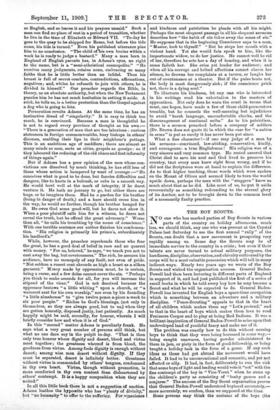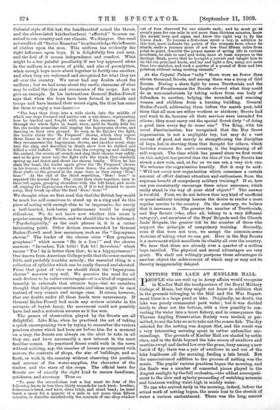1111, BOY SCOUTS.
NO one who has marked parties of Boy Scouts in various parts of the country on holiday afternoons, much less, we should think, any one who was present at the Crystal Palace last Saturday to see the first annual "rally" of the Scouts, can doubt that a new movement is prospering very rapidly among us. Some day the Scouts may be of immediate service to the country in a crisis ; but even if their talents are never turned to actual military purposes, the handiness, discipline, observation, and chivalry cultivated by the corps will be a most valuable possession which will tell in many indirect ways. Nearly two years ago we wrote of the Boy Scouts and wished the organisation success. General Baden- Powell had then been lecturing in different parts of England in support of it, and had just published the first of a series of small books in which he told every boy how he may become a Scout and what he will be expected to do. General Baden. Powell has invented for English boys a spare-time occupation which is something between an adventure and a military discipline. " Peace-Sconting " appeals to that in the heart of all children which makes them say "Let's pretend," and to that in the heart of boys which makes them love to read Fenimore Cooper and to play at being Red Indians. It was a brilliant inspiration of General Baden-Powell to seize upon that undeveloped land of youthful fancy and make use of it. The problem was exactly how to do this without causing boys to think that they were being hocussed in some way,— being caught unawares, having powder administered to them in jam, or piety in the form of good-fellowship, or being taught a holiday task in the form of a game. If any such ideas as those had got abroad the movement would have failed. It had to be unconventional and romantic, and yet not affected or silly. It had, in fact, deliberately to run the risk that some boys of light and leading would vote it "rot" with the fine contempt of the boy in " Vice-Versa " when he sums up the children's party as consisting of "bushy games and a conjurer." The success of the Boy Scout organisation proves that -General Badeii-Powell understood boyhood accurately,— more accurately, we confess, than we supposed at the time.
Some persons may think the costume of the boys (the
Colonial style of felt hat, the handkerchief round the throat, and the abbreviated knickerbockers) " affected " because un- suited to our country and our climate. We disagree. One need not swallow all "Sartor Resartus " to acknowledge the influence of clothes upon the man. This uniform has evidently the right influence upon boys. It is delightfully free and easy, and the feel of it means independence and comfort. What
might be a too painful peculiarity if one boy appeared alone in the uniform is a source of pride, and also of proselytism, when enough boys move about together to fortify one another, and when they are welcomed and recognised for what they are all over the country. We never had any doubts about the
uniform ; but we had some about the exotic character of what may be called the rites and ceremonies of the corps. Let us give an example. In his instructions General Baden-Powell says that when the boys have been formed in patrols and troops and have learned their secret signs, the time has come for them to enjoy a war-dance :—
" The boys then form into a wide circle, into the middle of which one steps forward and carries out a war-dance, representing bow he tracked and fought with one of his enemies. He goes through the whole fight in dumb show, until he finally kills his foe, the scouts meantime still singing the Ingonyama chorus, and dancing on their own ground. So soon as he finishes the fight, the leader starts the 'Be Prepared' chorus, which they repeat three times in honour of the scout who has just danced. Then they recommence the Ingonyama chorus, and another scout steps into the ring, and describes in dumb show how he stalked and killed a wild buffalo. While he does the creeping up and stalking the animal, the scouts all crouch and sing their chorus very softly, and as he gets more into the fight with the beast, they similarly spring up and dance and shout the chorus loudly. When he has slain the beast, the leader again gives the 'Be Prepared' thorns in his honour, which is repeated three times, the scouts banging their staffs on the ground at the same time as they stamp 'Boni ! born !' At the end of the third repetition, 'Born ! born !' is repeated the second time. The circle then close together, turn to their left again, grasping shoulders with the left hand, and move off, singing the Ingonyama chorus, or, if it is not desired to move away, they break up after the final Bom ! born !"?
We thought when we first read this that the British boy would be much too self-conscious to stand up in a ring and do this piece of acting with enough Elan to be impressive, for surely
a half-hearted, lack-lustre performance would be simply ridiculous. We do not know now whether this scene is popular among Boy Scouts, and we should like to be informed. " Psychologically," as the cant phrase is, it is st rather interesting point. Other devices recommended by General Baden-Powell need less assurance, such as the " Ingonyama chorus." The leader of the chorus cries "Een gonyitma gonytima! " which means " Ho is a lion !" and the chorus unswers : "Invooboo, Yah bObb I Yah b6 ! Invooboo," which means " Yes ! he is better than that; he is a hippopotamus ! " One knows from American College yells that the sense matters little, and probably troubles nobody; the essential thing is a collection of syllables which can be easily framed and shouted.
From that point of view we should think the "Ingonyama chorus" answers very well. We perceive the need for all such devices to be rather extravagant—it is a kind of organised insanity in externals that attracts boys—but we ourselves thought that indigenous sentiments and ideas might be used instead of very remote and savage ones. It seems, however, that our doubts under all these heads were unnecessary. If General Baden-Powell had made any serious mistake in his estimate of boyish fancy, the movement could not possibly have had such a notorious success as it has won.
The games of observation played by the Scouts- are all delightful. Like Kim, when he practised the art of taking a quick encompassing view by trying to remember the various precious stones which had been set before him for a moment on a tray, the Scouts are always on the alert to take in all they see, and have necessarily a new interest in the most familiar scenes. No practised Scout could walk in the town
without noticing, say, the number of horses as compared with motors, the contents of shops, the size of buildings; and so forth, or walk in the country without observing the position and amount of the water-supplies, the character of the timber, and the state of the crops. The official tests for Scouts are of exactly the right kind to ensure handiness, quickness, and accuracy. Thus
"To pass the second-class test a boy must tie four of the following knots in less than thirty seconds for each knot : bowline, fisherman's- bend, reef knot, clove hitch, and sheet bend; he must track a spoor for a quarter of a mile in nqt more than fifteen minutes, or describe satisfactorily the contents of one shop window out of four observed for one minute each ; and he must go 'tit scout's pace for one mile in not more than thirteen minutes, know the scouts' laws and signs, and know the right way to fly the Union Jack. To become afirst-class scout a boy, in addition to this test, must indicate the points of the compass from where he stands, make a journey alone of not less than fifteen miles from point to point, describe the proper means of saving life in various accidents, be able to read and write, have at least sixpence in the Savings Bank, prove that he brought a recruit and taught him to tie the six principal knots, and lay and light a fire, using not more than two matches, and cook a quarter of a pound of flour and two potatoes without using cooking utensils."
At the Crystal Palace "rally" there were no fewer than eleven thousand Scouts, and among them was a troop of Girl Scouts. During a sham fight by some Territorials and the Legion of Frontiersmen the Scouts showed what they could do as non-combatants by taking orders from one body of defenders to another, helping the wounded, and rescuing
women and children from a burning building. General Baden-Powell, addressing them before the march past, told them that all men are either workers or shirkers ; Scouts had real work to do, because all their services were intended for
others ; they must carry out the special Scout duty " of doing a good turn every day to some one." The King, with his
usual discrimination, has recognised that the Boy Scout organisation is not a, negligible toy, but may do a vast amount of good, not merely in strengthening the discipline
of boys, but in showing them that thought for others, which includes concern for one's country, is the beginning of all
self-respect. The time which has passed since we first wrote on this subject has proved that the idea of the Boy Scouts has struck a new vein, and, so far as we can see, a very rich one. We welcome the organisation heartily. But it may be said:
" Will not every new organisation which consumes a certain amount of effort distract attention and enthusiasm from the supreme benefit of compulsory military training P If so, how can you consistently encourage these minor successes, which
really stand in the way of your chief object P" The answer is twofold. First, we do not believe that any kind of unofficial or quasi-military training lessens the desire to render a more regular service to the country. On the contrary, we believe that it increases it. The greater the number of Territorials, and Boy Scouts (who, after all, belong to a very different category), and members of the Boys' Brigade and the Church Lads' Brigade, the greater will be the number of those who support the principle of compulsory training. • Secondly, even if this- were not true, we accept the commbn-sense doctrine of taking what we can get. Here in the Boy Scouts is a movement which manifests its vitality all over the country. We hear that there are already over a quarter of a million boys enrolled. The physical and moral advantages are very great. We shall not willingly postpone these advantages to another object the achievement of which may or may not be thereby inappreciably delayed.







































 Previous page
Previous page